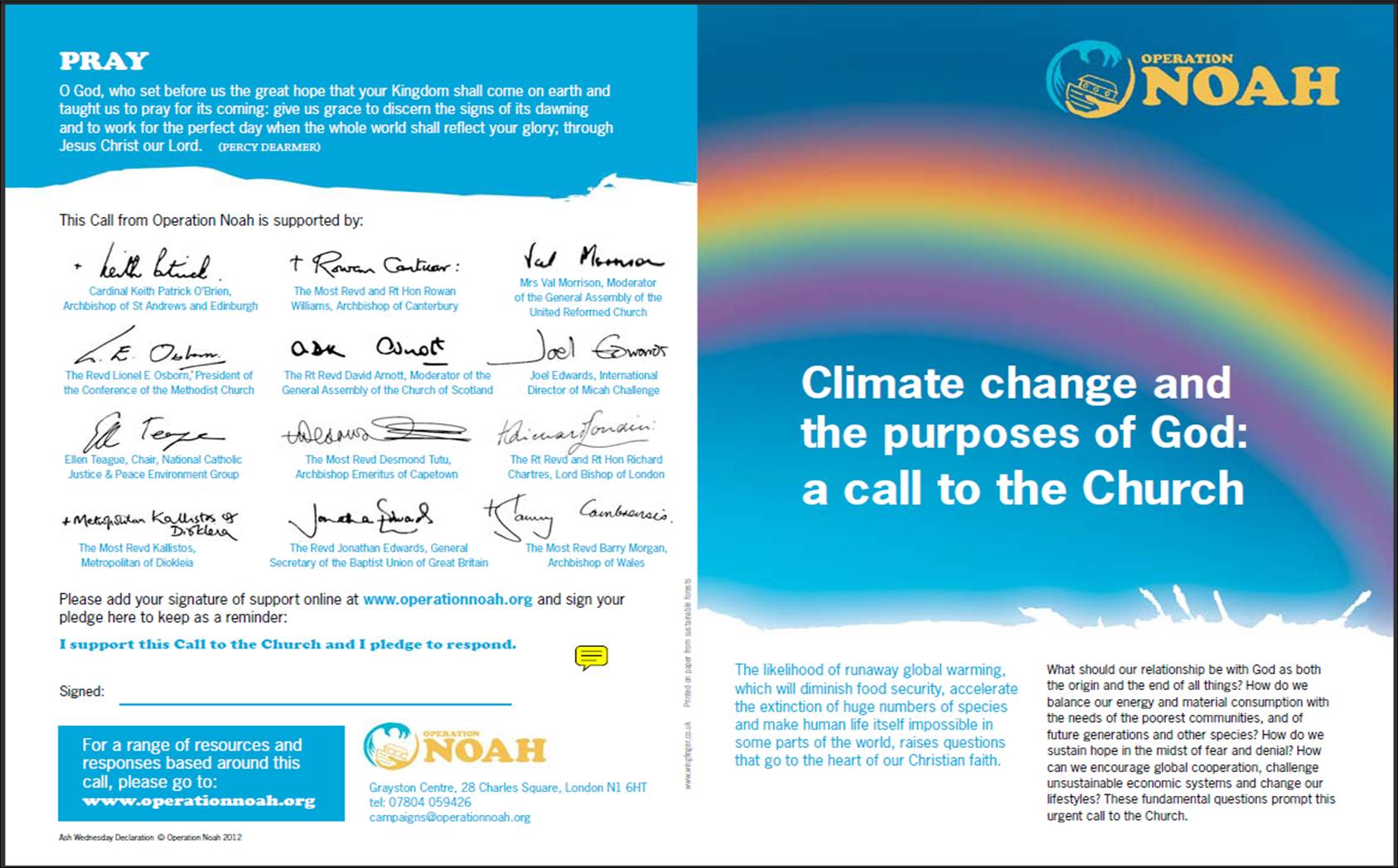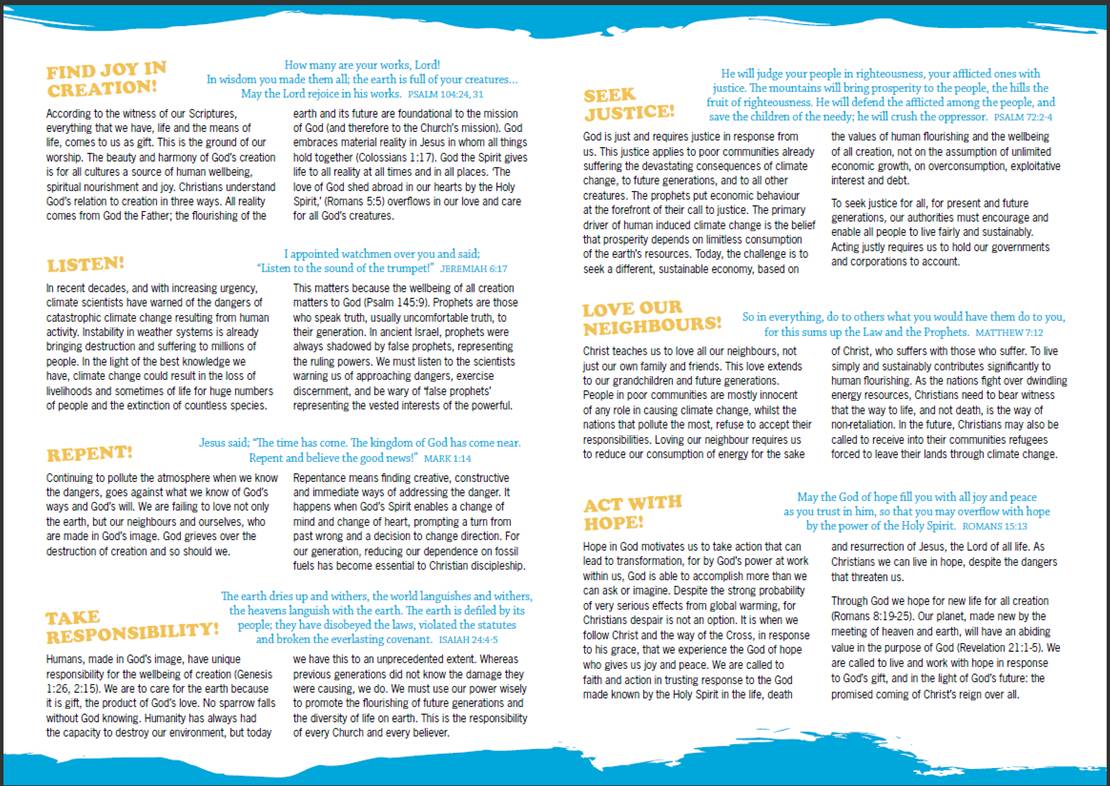Ash Wednesday Declaration - Operation Noah calls on church to tackle climate change

Wednesday 22nd February 2012
The Archbishop of Canterbury has signed the Ash Wednesday Declaration, launched by Operation Noah, which calls on the church to care for God's creation.The Declaration challenges the church to realise that concern about climate change is foundational to the Christian gospel and central to the church’s mission. Written by Operation Noah’s theology think tank, the Declaration has been signed by church leaders from across the denominations, including:
- Desmond Tutu, Archbishop Emeritus of Cape Town
- Barry Morgan, Archbishop of Wales
- Richard Chartres, Bishop of London
- Keith O'Brien, Archbishop of St Andrews and Edinburgh
- Val Morrison, Moderator of the General Assembly of the United Reformed Church
- Lionel Osborn, President of the Conference of the Methodist Church
- David Arnott, Moderator of the General Assembly of the Church of Scotland
- Joel Edwards, International Director of Micah Challenge
- Ellen Teague, Chair, National Catholic Justice & Peace Environment Group
- Metropolitan Kallistos of Diokleia
- Jonathan Edwards, General Secretary of the Baptist Union of Great Britain
A short public service of prayer and dedication to launch the Declaration was held on Ash Wednesday at St Mary-Le-Bow in London.
The text of the Declaration follows, and a pdf version of the document is attached. Further resources, including posters and other copies of the Declaration, and suggestions on how to respond to the call, can be found at the Operation Noah website.


The Declaration
Climate change and the purposes of God: a call to the Church
The likelihood of runaway global warming, which will diminish food security, accelerate the extinction of huge numbers of species and make human life itself impossible in some parts of the world, raises questions that go to the heart of our Christian faith.
What should our relationship be with God as both the origin and the end of all things? How do we balance our energy and material consumption with the needs of the poorest communities, and of future generations and other species? How do we sustain hope in the midst of fear and denial? How can we encourage global cooperation, challenge unsustainable economic systems and change our lifestyles? These fundamental questions prompt this urgent call to the Church.
FIND JOY IN CREATION!
‘How many are your works, Lord!
In wisdom you made them all; the earth is full of your creatures…
May the Lord rejoice in his works.’ (Psalm 104:24, 31)
According to the witness of our Scriptures, everything that we have, life and the means of life, comes to us as gift. This is the ground of our worship. The beauty and harmony of God’s creation is for all cultures a source of human wellbeing, spiritual nourishment and joy. Christians understand God’s relation to creation in three ways. All reality comes from God the Father; the flourishing of the earth and its future are foundational to the mission of God (and therefore to the Church’s mission). God embraces material reality in Jesus in whom all things hold together (Colossians 1:17). God the Spirit gives life to all reality at all times and in all places. ‘The love of God shed abroad in our hearts by the Holy Spirit’ (Romans 5:5) overflows in our love and care for all God’s creatures.
LISTEN!
‘I appointed watchmen over you and said; “Listen to the sound of the trumpet!”’ (Jeremiah 6:17)
In recent decades, and with increasing urgency, climate scientists have warned of the dangers of catastrophic climate change resulting from human activity. Instability in weather systems is already bringing destruction and suffering to millions of people. In the light of the best knowledge we have, climate change could result in the loss of livelihoods and sometimes of life for huge numbers of people and the extinction of countless species. This matters because the well-being of all creation matters to God (Psalm 145:9).
Prophets are those who speak truth, usually uncomfortable truth, to their generation. In ancient Israel, prophets were always shadowed by false prophets, representing the ruling powers. We must listen to the scientists warning us of approaching dangers, exercise discernment, and be wary of ‘false prophets’ representing the vested interests of the powerful.
REPENT!
‘Jesus said; “The time has come. The kingdom of God has come near. Repent and believe the good news!”’ (Mark 1:14-15)
Continuing to pollute the atmosphere when we know the dangers, goes against what we know of God’s ways and God’s will. We are failing to love not only the earth, but our neighbours and ourselves, who are made in God's image. God grieves over the destruction of creation and so should we. Repentance means finding creative, constructive and immediate ways of addressing the danger. It happens when God’s Spirit enables a change of mind and change of heart, prompting a turn from past wrong and a decision to change direction. For our generation, reducing our dependence on fossil fuels has become essential to Christian discipleship.
TAKE RESPONSIBILITY!
‘The earth dries up and withers, the world languishes and withers, the heavens languish with the earth. The earth is defiled by its people; they have disobeyed the laws, violated the statutes and broken the everlasting covenant.’ (Isaiah 24:4-5)
Humans, made in God’s image, have unique responsibility for the wellbeing of creation (Genesis 1:26, 2:15). We are to care for the earth because it is gift, the product of God’s love. No sparrow falls without God knowing. Humanity has always had the capacity to destroy our environment, but today we have this to an unprecedented extent. Whereas previous generations did not know the damage they were causing, we do. We must use our power wisely to promote the flourishing of future generations and the diversity of life on earth. This is the responsibility of every Church and every believer.
SEEK JUSTICE!
‘He will judge your people in righteousness, your afflicted ones with justice. The mountains will bring prosperity to the people, the hills the fruit of righteousness. He will defend the afflicted among the people, and save the children of the needy; he will crush the oppressor.’ (Psalm 72:2-4)
God is just and requires justice in response from us. This justice applies to poor communities already suffering the devastating consequences of climate change, to future generations, and to all other creatures. The prophets put economic behaviour at the forefront of their call to justice. The primary driver of human induced climate change is the belief that prosperity depends on limitless consumption of the earth’s resources. Today, the challenge is to seek a different, sustainable economy, based on the values of human flourishing and the well-being of all creation, not on the assumption of unlimited economic growth, on overconsumption, exploitative interest and debt.
To seek justice for all, for present and future generations, our authorities must encourage and enable all people to live fairly and sustainably. Acting justly requires us to hold our governments and corporations to account.
LOVE OUR NEIGHBOURS!
‘So in everything, do to others what you would have them do to you, for this sums up the Law and the Prophets.’ (Matthew 7:12)
Christ teaches us to love all our neighbours, not just our own family and friends. This love extends to our grandchildren and future generations. People in poor communities are mostly innocent of any role in causing climate change, whilst the nations that pollute the most, refuse to accept their responsibilities. Loving our neighbour requires us to reduce our consumption of energy for the sake of Christ, who suffers with those who suffer. To live simply and sustainably contributes significantly to human flourishing. As the nations fight over dwindling energy resources, Christians need to bear witness that the way to life, and not death, is the way of non-retaliation. In the future, Christians may also be called to receive into their communities refugees forced to leave their lands through climate change.
ACT WITH HOPE!
‘May the God of hope fill you with all joy and peace as you trust in him, so that you may overflow with hope by the power of the Holy Spirit.’ (Romans 15:13)
Hope in God motivates us to take action that can lead to transformation, for by God’s power at work within us, God is able to accomplish more than we can ask or imagine. Despite the strong probability of very serious effects from global warming, for Christians despair is not an option. It is when we follow Christ and the way of the Cross, in response to his grace, that we experience the God of hope who gives us joy and peace. We are called to faith and action in trusting response to the God made known by the Holy Spirit in the life, death and resurrection of Jesus, the Lord of all life. As Christians we can live in hope, despite the dangers that threaten us.
Through God we hope for new life for all creation (Romans 8:19-25). Our planet, made new by the meeting of heaven and earth, will have an abiding value in the purpose of God (Revelation 21:1-5). We are called to live and work with hope in response to God’s gift, and in the light of God’s future: the promised coming of Christ’s reign over all.
O God, who set before us the great hope that your Kingdom shall come on earth and taught us to pray for its coming: give us grace to discern the signs of its dawning and to work for the perfect day when the whole world shall reflect your glory; through Jesus Christ our Lord. (Percy Dearmer)
© Operation Noah 2012
